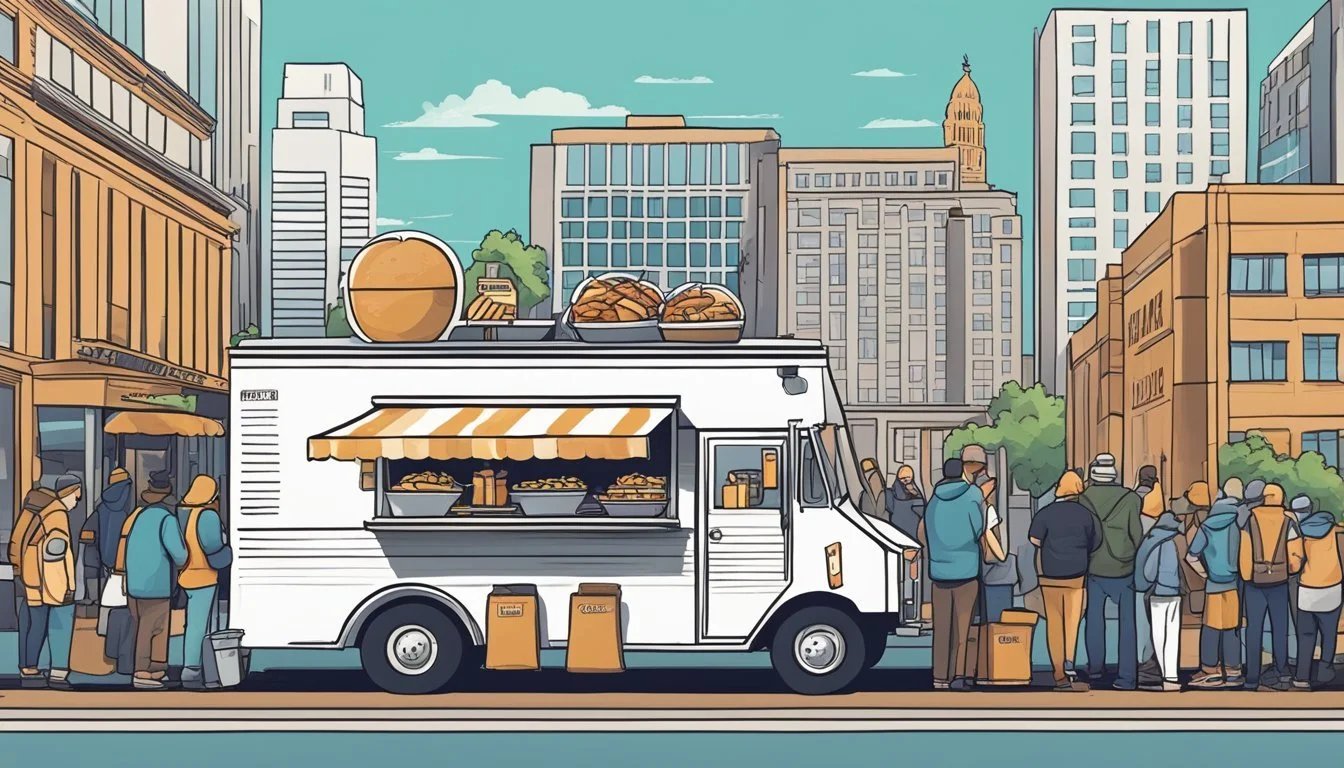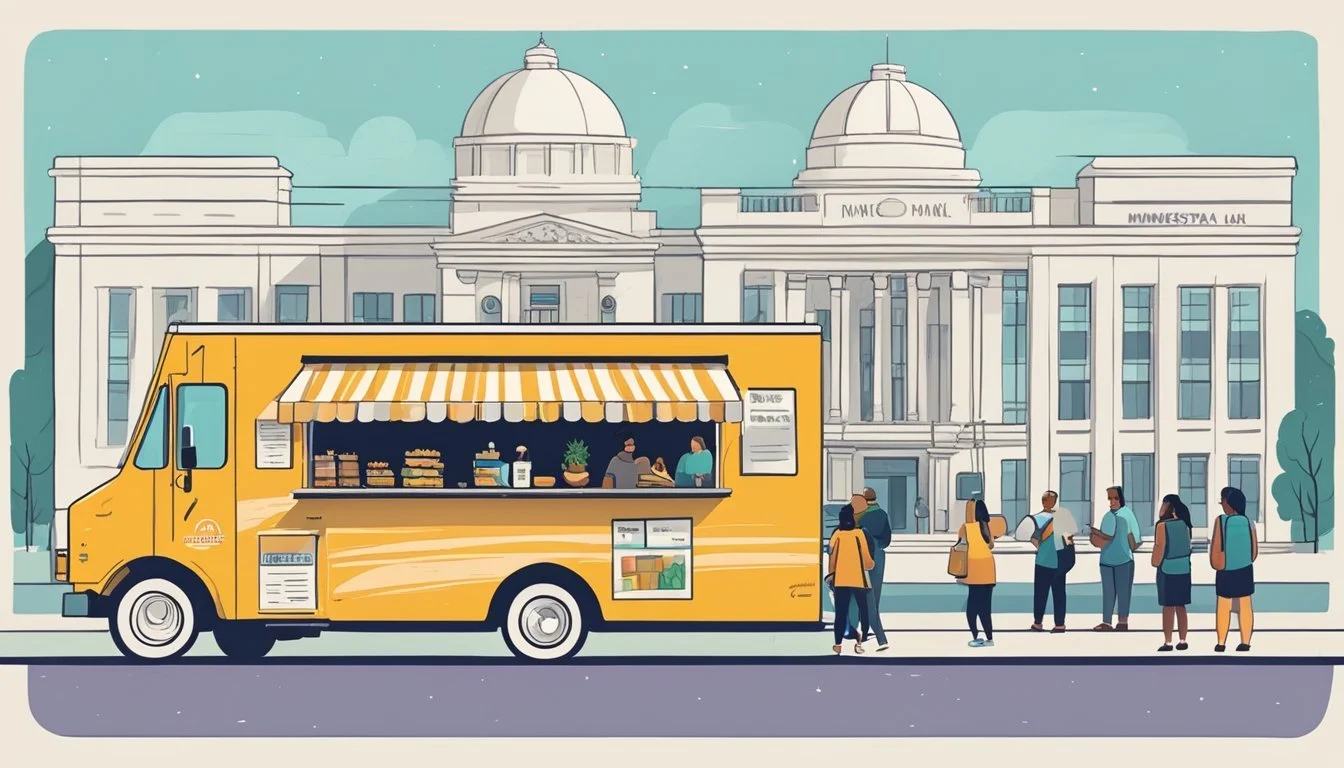Food Truck Laws in Minnesota
Regulations and Compliance for Vendors
Operating a food truck in Minnesota involves navigating a series of legal and regulatory requirements designed to ensure public safety and fair business practices. Entrepreneurs looking to start a mobile food unit must secure various licenses and permits that are also required by traditional food establishments. This includes obtaining a business license, food handlers' permits for all employees, and a food truck-specific license, also known as a mobile food facility permit.
The landscape of food truck laws in Minnesota is multifaceted, as operators must meet both state-level and local municipality regulations to legally serve food to the public. For example, food and beverage service establishments that utilize vehicle-mounted units are subjects to rigorous health and safety standards outlined by the Minnesota Department of Health and the Minnesota Department of Agriculture. Food truck owners must also familiarize themselves with the local codes and ordinances that govern where and when they can operate within different cities and counties across the state.
Part of the challenge for food truck owners includes staying up-to-date with changes in these requirements, which can sometimes vary year to year or between jurisdictions. Organizations such as the MN Food Truck Association can aid entrepreneurs in understanding the specifics of operation and advocacy in city regulation matters. It's essential for mobile food unit owners to thoroughly review the components of compliance to not only start but maintain a successful and legal mobile food business in Minnesota.
Getting Started with Food Truck Business in Minnesota
When launching a food truck in Minnesota, understanding the specific legal requirements and taking the correct initial steps are crucial. These include navigating the laws, acquiring licenses, and adhering to local economic development initiatives.
Understanding Food Truck Laws
In Minnesota, operating a food truck requires compliance with a myriad of laws that govern food safety, business operations, and public welfare. Every food truck owner must obtain a Business License and ensure their mobile food unit passes the Plan Review through the Department of Health. It's imperative to familiarize oneself with Minnesota's codes and regulations to avoid legal complications.
Health Department & Licensing:
Licensing: Food truck operators must have valid licenses, which include both state-level licenses and potentially additional local city licenses.
Permits: Special events often require separate Permits which must be secured in advance.
Health & Safety Codes:
Local food safety regulations must be meticulously followed.
Regular inspections ensure compliance with the Minnesota Food Code.
First Steps to Launch
The entrepreneur's journey in the Minnesota food truck business starts with a structured approach:
Application:
Submit detailed applications to the appropriate agencies.
Procedures may vary by locale, but fundamental safety and operational guidelines remain constant.
Plan Review:
Includes a thorough assessment of the vehicle, equipment, and food preparation protocols.
Critical for ensuring the safety of customers and compliance with health regulations.
Economic Development:
Align with local economic development initiatives.
Can provide access to funding, special event participation, and strategic business positioning.
A robust Business Plan plays a pivotal role in outlining the food truck's concept, financial forecasts, and long-term objectives. This document is often required when applying for licenses, permits, and when seeking financing. The plan should comprehensively cover all aspects from menu options to waste disposal, with a clear path to growth and sustainability.
Each step lays the groundwork for a successful food truck enterprise in Minnesota. With diligent attention to detail and proactive planning, an entrepreneur can navigate the complexities of the food truck industry.
Licensing and Permits
For food truck owners in Minnesota, navigating the requirements for licensing and permits is a critical step. Adherence to both state and local regulations ensures legal operation and food safety.
State Licensing Requirements
In Minnesota, food truck operators must obtain a Mobile Food Unit license from the state. The Minnesota Department of Health (MDH) oversees the licensing, ensuring that mobile food units meet the necessary food safety requirements. A license application must be completed and submitted along with the required fees.
Local Permits and Regulations
Local municipalities such as Minneapolis impose additional permitting requirements for food trucks. Operators must apply for permits that allow them to park and sell food within the city limits. Specifics can be acquired through the Minneapolis Public Service Building or by referencing City of Minneapolis food truck guidelines. Compliance with local health, safety, and parking regulations is mandatory.
Special Event and Temporary Licenses
Food trucks participating in special events or operating on a temporary basis must secure additional licenses, often referred to as transient licenses or temporary food service licenses. These licenses are usually event-specific and are governed by the locality in which the event is held. Acquiring this license typically involves a separate application process through the local health department or event organizers.
Operating a Food Truck
Operating a food truck in Minnesota encompasses choosing a strategic location, ensuring the food preparation and equipment meet the necessary standards, and adhering to stringent health and safety inspections.
Selecting a Location
The location of a food truck has a significant impact on its success. Food truck owners must consider foot traffic, proximity to their target audience, and local zoning laws. It's crucial to obtain the correct permits and understand any location-specific fees. The MN Food Truck Association provides guidance in event booking and navigating city regulations concerning food truck operations.
Food Preparation and Equipment
Proper food preparation and equipment are fundamental for a mobile food unit's operation. Refrigeration systems must maintain the correct temperatures to ensure food safety, and all cooking apparatus should meet the prescribed safety standards of the Minnesota Department of Health. Compliance with the food safety guidelines, including ServSafe certification, is crucial for all staff involved in the food preparation process.
Health and Safety Inspections
Regular health and safety inspections are mandatory, and food trucks must pass these to continue operating. Inspections will focus on cleanliness, proper food handling, and storage, as well as the presence of a fire extinguisher that is readily accessible. The Minnesota Department of Agriculture oversees the licensing and registration process, ensuring mobile food units maintain high standards of food safety to minimize the risks of foodborne illnesses.
Regulations and Compliance
Navigating the landscape of Food Truck Laws in Minnesota demands a thorough understanding of the diverse regulations pertaining to menu composition, environmental health, and responsible waste management. Food truck operators are mandated to comply with multifaceted rules for the safety and satisfaction of their clientele.
Menu and Ingredients Compliance
In Minnesota, food trucks must ensure that their menus and ingredients adhere to state regulations. Consistent inspections are carried out by the Health Department to verify that all food items are properly labeled and sourced. A critical aspect is the ServSafe certification, a widespread food and beverage safety training and certificate program administered by the National Restaurant Association. This certification ensures that staff are proficient in food safety laws and best practices.
Menu and Ingredients Must:
Align with Minnesota's food codes
Be screened during regular Health Department checks
Comply with all labeling laws
Environmental Health and Safety
Food trucks are subject to the Minnesota Department of Health's environmental health regulations, which are designed to safeguard both consumers and service providers. Mobile food units are inspected to confirm they are maintaining sanitation standards and food safety protocols. These units must possess a legitimate water supply and sewage treatment system to manage waste effectively and avoid contamination.
Key Environmental Health Checks Include:
Adequate water supply and quality
Proper waste disposal and sewage management
Regular health and safety assessments by authorities
Waste Management
Effective waste management strategies are imperative for food trucks to remain in legal compliance and to lessen their environmental footprint. They are required to deploy an appropriate system for trash disposal and wastewater treatment. The Minnesota Department of Agriculture outlines specific guidelines regarding waste disposal to assure cleanliness and prevent environmental damage.
Waste Management Protocols Entail:
Designated waste receptacles for consumers
Authorized wastewater disposal methods
Regular waste collection and removal services
Business Operations and Growth
When managing a food truck in Minnesota, it's crucial for owners to navigate the complexities of insurance requirements, foster brand loyalty, and chart a path for business expansion, all while ensuring legislative and economic considerations are met.
Insurance and Liability
Operating a food truck business demands securing appropriate insurance coverages. Most notably, obtaining liability insurance is non-negotiable to protect against potential claims. Minnesota law requires food trucks to carry a Certificate of Insurance (COI) that evidences their policies. Moreover, a comprehensive plan often includes property, auto, and workers' compensation insurance. A team should thoroughly assess their risks to determine the necessary coverage levels, factoring in the dynamic nature of food truck operations.
Brand and Community Engagement
Strong brand identity and active community involvement are indispensable for a food truck's success. The Minnesota Food Truck Association can be instrumental in providing guidance on community planning and fostering local partnerships. Food trucks should engage with the community not only through events but also via social media to build a loyal customer base. Economical development opportunities arise as the brand becomes synonymous with distinct culinary experiences.
Scaling Your Food Truck Business
As a food truck entrepreneur plans to expand, strategic considerations must be taken. Growth can be facilitated by investing in additional units, ventless hoods for cooking efficiency, or exploring catering services. A clear sales tax strategy must be implemented to ensure regulatory compliance. Additionally, a food truck business may opt for a formal business structure like a partnership and must obtain an Employer Identification Number (EIN) for tax purposes. Expansion should align with the food truck's operational capacities and economic forecasts.
Special Considerations
In navigating the intricate landscape of Minnesota's food truck regulations, business owners must pay particular attention to nuanced scenarios. These include leveraging private property, tapping into the niche markets of special events, and forging strategic alliances to expand their food and beverage service footprint.
Working with Private Properties and Partnerships
Food trucks intending to operate on private property require explicit permission from property owners. It's a strategic move that can offer stability and a steady customer base. The Minnesota Food Truck Association provides guidance on negotiations and best practices for forming sustainable partnerships that can benefit both the food truck operator and the property owner.
Food Trucks at Weddings and Private Events
Catering for weddings and private events has become a popular choice, allowing food trucks to showcase their unique cuisine in more intimate settings. When providing food and beverage services at such events, operators must ensure that their license laws allow for this kind of operation and be prepared for potential remodel needs to fit these special occasions.
Collaborating with Breweries and Farmers Markets
Food trucks have found great synergy in working alongside breweries and farmers markets. Due to both entities' tendency to attract large crowds interested in alcohol business and local produce, food trucks can capitalize on the increased traffic. However, collaborating with these establishments often involves additional licensing, confirming that the food truck is an authorized motorized food and beverage service establishment, and adhering to specific health and safety regulations pertinent to these environments.
Additional Resources
Navigating the food truck industry in Minnesota involves understanding a variety of regulations and tapping into supportive networks. Entrepreneurs can benefit from the collective experience of associations, and detailed legal texts for a comprehensive view of operating a mobile food unit.
Food Truck Associations and Networks
The Minnesota Food Truck Association (MFTA) serves as a pivotal resource for food truck owners. They address day-to-day operational questions and foster networking, helping members navigate the nuances of the food truck business within the Twin Cities and beyond. Prepackaged food and container regulations, common to food carts, are among the many topics covered by the MFTA.
For those focusing on community engagement, the role of Community Planning & Economic Development cannot be understated. Reaching out to these entities often provides insights into local zoning and parking regulations critical to operating a mobile food unit.
Further Reading on Food Truck Laws
For a deep dive into legal requirements, the Minnesota Department of Health offers comprehensive guidelines pertaining to the licensing and food safety obligations of mobile food units. It is crucial for a food truck, which is essentially a vehicle-mounted food service establishment, to adhere to these standards to ensure safe operation and minimize the risk of foodborne illness.
Additional legal literature and resources can be found through the Minnesota Department of Agriculture, focusing on licensing and registration relevant to mobile food units. This repository of information serves as a further reading reference, supportive for both established food truck operators and new entrants.






